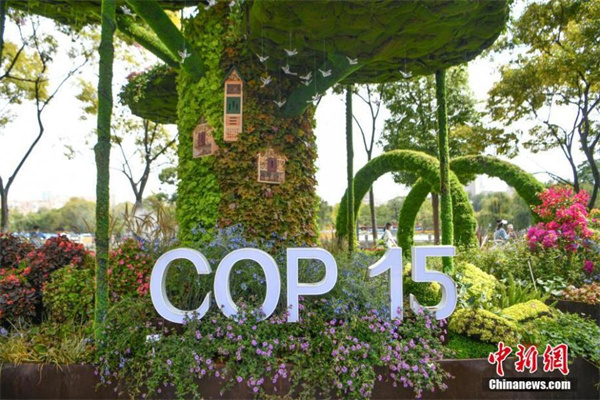
Hundreds of mosaicultures set to greet the upcoming 15th meeting of the Conference of the Parties to the Convention on Biological Diversity (COP15) appeal to tourists in Kunming, capital city of Southwest China's Yunnan province. [Photo/Chinanews.com]
To ensure a successful United Nations Biodiversity Conference (COP 15), China has been endeavoring to strengthen multilateral dialogues and bridge communication between developed and developing economies in the lead-up to the largest UN biodiversity gathering in a decade, experts said.
Upholding multilateralism, the country will consistently promote international cooperation on biodiversity conservation and strive to reach an ambitious and realistic post-2020 global biodiversity framework, they also said.
Chinese central authorities have attached great importance to multilateralism in the lead-up to COP 15, which refers to the 15th meeting of the Conference of the Parties to the Convention on Biological Diversity.
The summit, which is tasked with elaborating on the post-2020 global biodiversity framework and identifying new protection goals through 2030, will be held in Kunming, the capital of Southwest China's Yunnan province, from Oct 11 to 15, and will continue in the first half of next year.
While addressing the UN Summit on Biodiversity on Sept 30 last year, President Xi Jinping emphasized that the world needs to uphold multilateralism and build synergy for global governance on the environment.
"Faced with the risks and challenges to the environment worldwide, countries share a common stake as passengers in the same boat and form a community with a shared future," he said.
"Unilateralism finds no support. Cooperation is the right way forward," Xi added. "We must firmly safeguard the UN-centered international system and uphold the sanctity and authority of international rules so as to enhance global governance on the environment."
Cui Shuhong, head of the nature and eco-conservation department at the Ministry of Ecology and Environment, said the president's address demonstrated that China is a responsible major power in environmental governance.
Besides building consensus on biodiversity conservation, Xi's speech also injected strong political impetus into joint global efforts to cope with biodiversity challenges and foster a community of life for man and nature, Cui said.
"Faced with the global biodiversity crisis, all people are members of a community where they rise and fall together," he added.
As a participant, contributor and trailblazer in global ecological conservation, China has actively participated in the process of global biodiversity governance, Cui said. The country has also endeavored to build a fair, equitable and win-win global environmental governance mechanism.
Since 2019, China has contributed the most to the General Trust Fund for the Convention on Biological Diversity, Cui noted. For years, it outpaced other developing countries in terms of the contributions to the Global Environment Facility and the Intergovernmental Science-Policy Platform on Biodiversity and Ecosystem Services.
Joining hands with the international community, China will continue to promote the construction of a green Belt and Road and deepen South-South cooperation on biodiversity conservation, he said.
"Through our efforts, we hope we can help developing countries to realize their targets and minimize their gaps in implementing the Convention on Biological Diversity and hitting the sustainable development goals," Cui added.
The world is now in a critical stage for conserving biodiversity and realizing sustainable development, he said, adding that the post-2020 global biodiversity framework to be hammered out at COP 15 will make plans for global biodiversity governance in the coming 10 years and beyond.
He said China has been proactively exchanging views with other parties via multilateral channels.
By making full use of the existing communication mechanisms with Europe and Africa, as well as countries such as France, the United Kingdom, Japan and South Korea, China has been energetically bridging developed and developing countries to promote exchanges and communication on key issues, Cui said.
China has intensified high-level global dialogue on international cooperation on biodiversity conservation, according to the Post-2020 Global Biodiversity Conservation 2021 Report, released earlier this month by the China Council for International Cooperation on Environment and Development.
The council, chaired by Vice-Premier Han Zheng, is a high-level international advisory body that comprises officials and experts from China and abroad who provide policy advice to the Chinese government.
Since May, for example, China has organized by itself or with other international organizations at least five conferences at ministerial level or above, all with the theme of biodiversity conservation, the report said.
Liu Ning, deputy executive director of the office of the executive committee for COP15, said that "Ecological Civilization-Building a Shared Future for All Life on Earth" is not only the theme of the Kunming gathering, but also a wish for the future.
Ecological civilization is a concept promoted by President Xi for balanced and sustainable development that features the harmonious coexistence of man and nature.
This will be the first time that the UN has held a conference under the theme of ecological civilization. This demonstrates the international significance of Xi Jinping Thought on Ecological Civilization, Liu said while addressing the council's annual general meeting in early September.
"Continuously committed to multilateralism, China will share with other parties its practices and experiences in ecological civilization construction and biodiversity conservation," he said.
Liu also called for joint global action to synergize efforts in coping with the planet's challenges of climate change, biodiversity loss, land deterioration and food safety, making full use of the opportunity to elaborate on the post-2020 global biodiversity framework in COP 15.